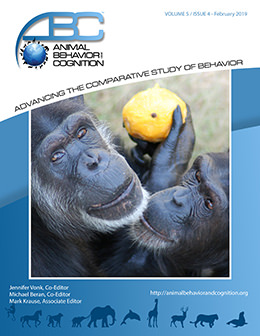Vol 6, Issue 1, February 2019
Inclusive Fitness does not Impact the Survival Processing Effect
Citation
Krause, M. A., Trevino, S., Cripps, A., Chilton, K., Sower, E., & Taylor, J. P. (2019). Inclusive fitness does not impact the survival processing effect. Animal Behavior and Cognition, 6(1), 13-31. https://doi.org/10.26451/abc.06.01.02.2019
Abstract
Natural selection acts upon learning and memory processes, much as it does with other physical and behavioral characteristics. For example, numerous lines of inquiry using nonhuman species hypothesize adaptive specializations of Pavlovian conditioned responses and spatial memory. Comparatively less is known about the influence of evolution on learning and memory processes in humans, but the past decade has seen a growing interest in this area; particularly since the publication of Nairne, Thompson, and Pandeirada’s (2007) paper reporting the survival processing effect (SPE). The SPE describes a mnemonic advantage of considering one’s survival in an evolutionarily relevant scenario: Words encoded in such a scenario are better remembered than are words encoded in relation to survival irrelevant scenarios. Numerous publications inspired by Nairne et al.’s paper have subsequently attempted to describe the specific mechanisms, evolutionary and otherwise, that account for the SPE. In four experiments we tested whether manipulating levels of inclusive fitness in survival scenarios influences recall. In our scenarios we asked participants to consider the survival of kin, and other categories of social relationships (self, strangers, family, a famous person), in an evolutionarily relevant context. The basic SPE was replicated in three of the four experiments. However, although kin selection is an important evolutionary mechanism, it appears to be unrelated to the SPE in our sample.
Keywords
Survival processing effect, Kin selection, Inclusive fitness, Adaptive memory, Evolution of learning, Evolution of memory
